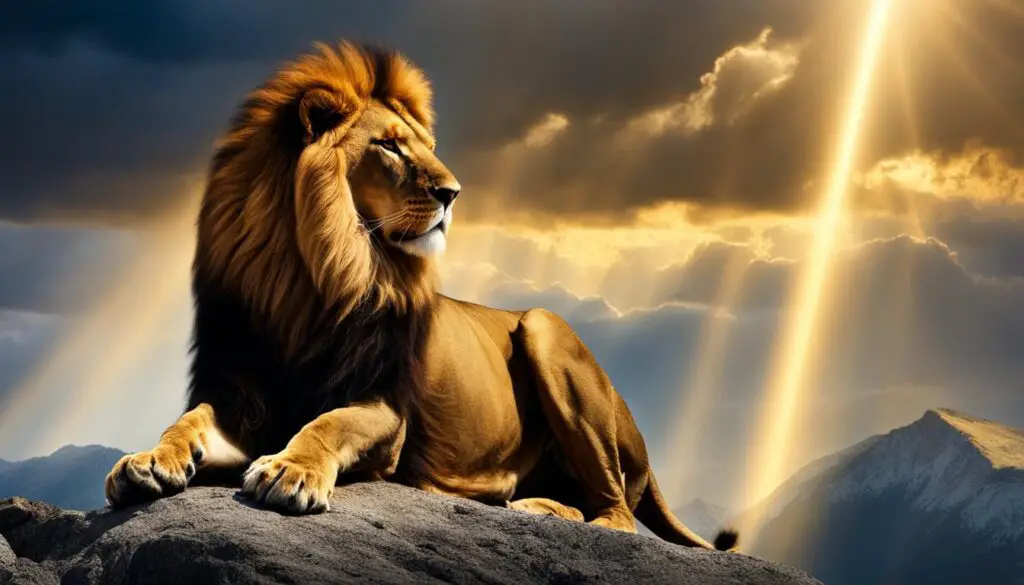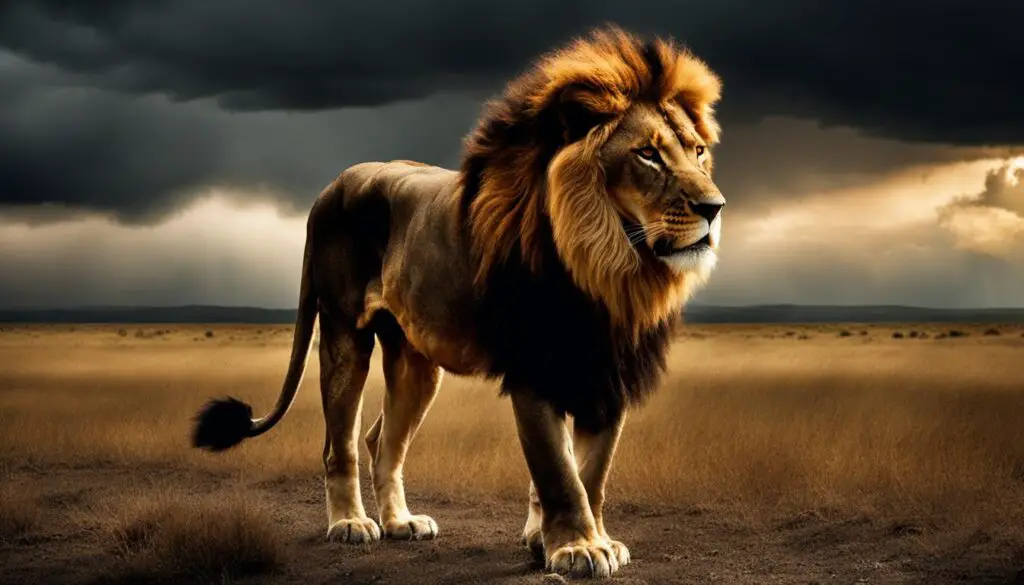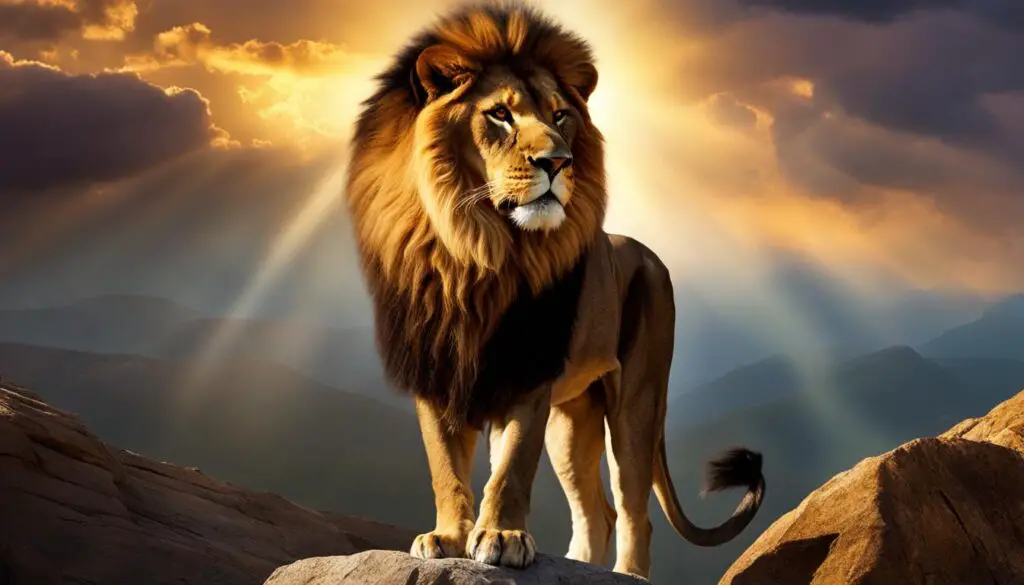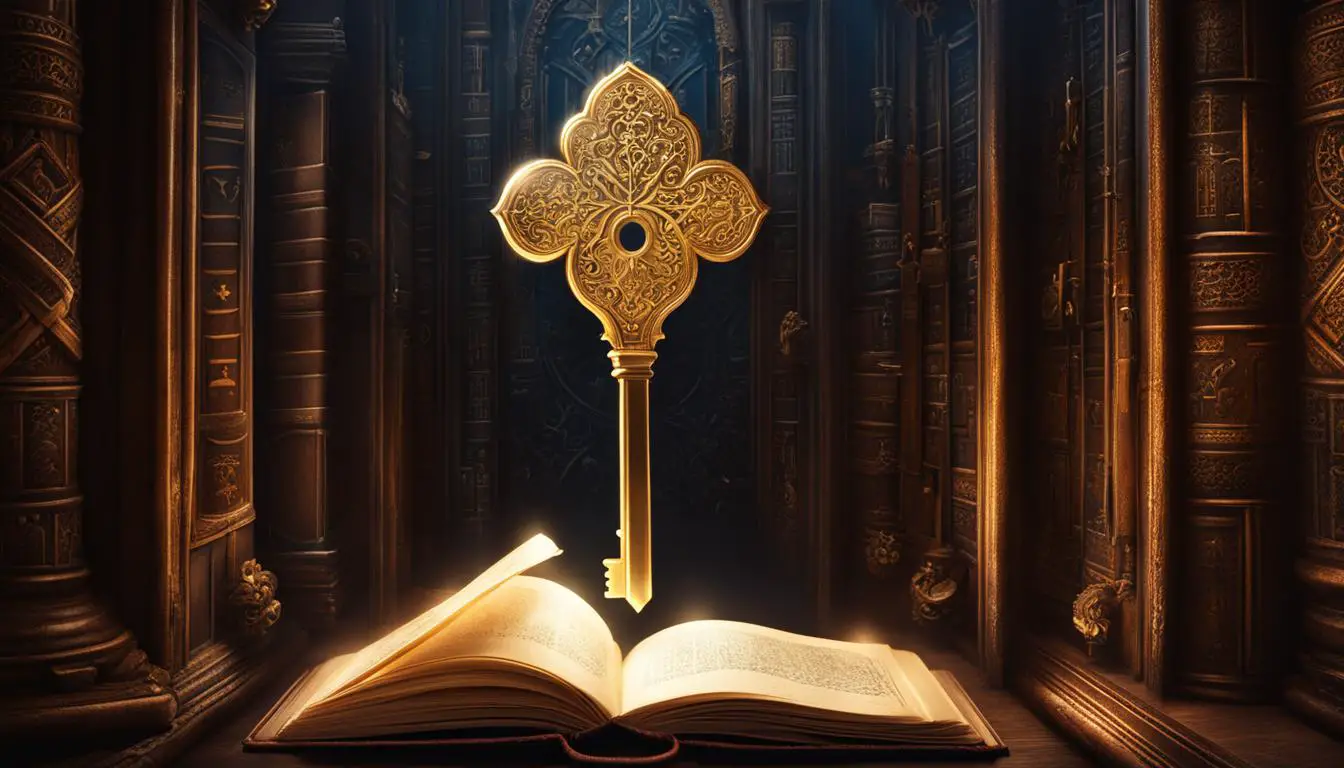Lions are mentioned in the Bible as a symbol of strength, courage, and nobility. The lion’s symbolism extends to the story of Daniel in the lions’ den, where God showed His authority over even the most powerful of beasts. Jesus is referred to as the Lion of Judah, representing his conquering power and authority.
Key Takeaways:
- The lion symbolizes strength, courage, and nobility in the Bible.
- Jesus is referred to as the Lion of Judah, highlighting his conquering power.
- The story of Daniel in the lions’ den showcases God’s authority over powerful beasts.
The Lion as King of the Beasts
The lion has long been recognized as the king of beasts, a majestic and powerful creature that exudes strength and royalty. In biblical symbolism, the lion represents the authority and power of God. Its regal demeanor and commanding presence make it a fitting representation of God’s sovereignty.
Throughout history, the lion’s association with kingship and rulership has been prevalent in various cultures. Ancient civilizations, such as Egypt and Mesopotamia, depicted their rulers as lion-like figures, emphasizing their divine authority and supremacy. The lion’s position as the apex predator in the animal kingdom further reinforces its status as the king of beasts.
| Symbolism | Description |
|---|---|
| Majesty | The lion’s majestic appearance and commanding presence symbolize power and nobility. |
| Strength | The lion’s physical prowess and hunting skills represent strength and dominance. |
| Royalty | The lion’s association with kingship and rulership signifies royalty and divine authority. |
Within the context of the Bible, the lion’s symbolism as the king of beasts is employed to illustrate God’s might and dominion. Just as a king rules over his kingdom, God rules over all creation with unmatched power and sovereignty.
The Lion as a Symbol of God’s Might
The lion, with its majestic presence and powerful roar, is often regarded as a symbol of God’s might and strength. In the Bible, the lion is portrayed as a conquering force, representing victory and triumph over evil. Its roar serves as a reminder of God’s authority and power, resonating with His ability to overcome any obstacle or enemy. Just as a lion rules over its territory, God reigns supreme and ensures justice and righteousness prevail.
Throughout biblical narratives, the lion’s symbolism is evident in passages like Isaiah 31:4, where the Lord is described as a lion roaring against His adversaries. This imagery emphasizes the divine conquest of evil forces and the assurance of victory for those who trust in God’s might. The lion’s strength and ferocity reflect God’s unwavering protection and His ability to defend His people from harm.
The lion’s roar is a powerful proclamation of God’s authority, shaking the foundations and striking fear in the hearts of those who oppose Him. It is a call to recognize His sovereignty and submit to His divine rule.
As believers, the lion’s symbolism encourages us to take refuge in God’s might and find courage in His presence. Just as a lion fearlessly faces its enemies, we can face challenges with confidence, knowing that we are protected and empowered by the Creator of all things. The lion’s image serves as a reminder of God’s faithfulness and the ultimate victory that is found in Him.

The Lion’s Roar and God’s Conqueror
In the Bible, the lion’s roar is often associated with God’s powerful intervention and triumph over His enemies. One example is found in the book of Joel 3:16, where it is said, “The Lord roars from Zion and utters his voice from Jerusalem; the heavens and the earth quake. But the Lord is a refuge to his people, a stronghold to the people of Israel.” This passage illustrates the lion’s roar as a declaration of God’s ultimate victory and a symbol of His protection for His people.
The lion’s roar is a call to action for believers, urging them to stand firm and courageous in the face of adversity. Just as a roaring lion inspires fear and respect, God’s mighty roar reminds us of His authority and power. It is a rallying cry for His followers to trust in His strength and to seek His guidance and protection.
| Lion Symbolism | Meaning |
|---|---|
| Strength | The lion represents God’s incredible strength and power. |
| Victory | The lion symbolizes triumph over evil and the ultimate victory that comes through faith in God. |
| Conqueror | God is depicted as a conquering lion, displaying His authority and dominion over all things. |
As we embrace the lion’s symbolism, we are reminded of God’s might and His role as the ultimate conqueror. His victorious roar echoes through the pages of Scripture, inspiring us to trust in His power and seek His guidance in all aspects of our lives.
The Lion of Judah: Symbolism of Strength and Victory
The Lion of Judah is a powerful symbol used in the Bible to represent Jesus and his role as the conquering King and Savior. This symbolism highlights Jesus’ strength, authority, and ultimate victory over sin and death. As the Lion of Judah, Jesus embodies the attributes traditionally associated with lions – strength, courage, and nobility. It is through his divine power that believers find strength and salvation.
Throughout the Bible, the imagery of the lion is used to convey the magnitude of Jesus’ power and victory. Just as a lion is the king of the beasts, Jesus is the true King, reigning with authority and majesty. His roar reverberates through the spiritual realm, symbolizing the conquering force he possesses. The Lion of Judah is a reminder of the triumph the faithful can experience through their relationship with Jesus.
“The Lion of Judah is not a timid or passive figure. He is fierce, mighty, and bold. He exemplifies the strength and courage that we can find in Him, enabling us to overcome any challenge,” says Pastor John of The Lion’s Den Church.
The Symbolism of the Lion in the Bible
The lion symbolism extends beyond Jesus’ identity as the Lion of Judah. Lions are frequently mentioned throughout the Bible as metaphors for strength, courage, and divine protection. For example, in Psalm 28:7, it states, “The Lord is my strength and my shield; my heart trusts in him, and he helps me. My heart leaps for joy, and with my song I praise him.” Here, the lion represents God’s strength and protection for those who trust in Him.
Moreover, the lion’s victory over its enemies reflects the triumph believers can experience in their own lives. In 1 Peter 5:8, it says, “Be alert and of sober mind. Your enemy the devil prowls around like a roaring lion looking for someone to devour.” This imagery serves as a warning to remain steadfast in faith and resist the schemes of the enemy.
| Biblical References | Symbolism |
|---|---|
| Genesis 49:9 | Jesus as the Lion of Judah |
| Psalm 28:7 | God’s strength and protection |
| 1 Peter 5:8 | The enemy’s schemes |
The symbolism of the Lion of Judah and the lion throughout the Bible serves as a powerful reminder of God’s strength, victory, and the courage available to believers through their faith in Jesus.
Lions in Apocalyptic Literature
Lions hold a significant place in apocalyptic literature, where they are often used as powerful symbolic representations. In this context, the lion symbolizes strength, dominance, and destruction. One notable mention is the comparison of Satan to a roaring lion, seeking to terrify and destroy believers.
“Be alert and of sober mind. Your enemy the devil prowls around like a roaring lion looking for someone to devour.” – 1 Peter 5:8
This vivid imagery highlights the enemy’s relentless pursuit to undermine and discourage the faithful. Just as a roaring lion can strike fear into the hearts of its prey, so too does Satan aim to instill fear and doubt in the minds of believers. However, this comparison also serves as a reminder of the need to stand firm in faith and resist the enemy’s schemes.
Apocalyptic literature, with its dramatic and symbolic language, often presents lions as agents of chaos and destructive forces. These references emphasize the cosmic battle between good and evil, and the lion symbolizes the power and aggression associated with the enemy.

The Roaring Lion as a Symbol of the Enemy
In biblical terms, the roaring lion represents the adversary’s attempts to instill fear and destruction. Its mighty roar signifies the enemy’s relentless pursuit of causing chaos and devouring those who fail to stay alert and grounded in their faith.
While the lion symbolism in apocalyptic literature highlights the enemy’s power, it also serves as a call to remain steadfast and trust in God’s protection and deliverance. Just as lions are feared for their strength, believers are reminded to fearlessly face the challenges and trials of life, knowing that God is the ultimate conqueror.
Standing Firm in Faith
The lion’s symbolism in apocalyptic literature not only showcases the enemy’s viciousness but also serves as a reminder of the need for believers to stand firm in faith. By trusting in God’s power and protection, believers can withstand the enemy’s attacks and emerge victorious.
Overall, the presence of lions in apocalyptic literature highlights the intensity of the spiritual battle between good and evil. As believers navigate through the challenges of life, they are encouraged to remain vigilant, rely on God’s strength, and stand firm in their faith.
Lion References in Specific Bible Verses
The Bible contains numerous references to lions, using them as powerful metaphors for strength, courage, and divine protection. These verses serve as reminders of the lion’s symbolism and the importance of relying on God’s strength in challenging times.
Lion Symbolism in Bible Verses
1. Psalm 28:7 – “The LORD is my strength and my shield; my heart trusts in him, and he helps me. My heart leaps for joy, and with my song I praise him.” In this verse, God is portrayed as both a shield and a source of strength. The lion, known for its courage and protective nature, represents God’s divine protection over His people.
2. Proverbs 28:1 – “The wicked flee though no one pursues, but the righteous are as bold as a lion.” This verse contrasts the behavior of the wicked and the righteous. The righteous, represented by the lion, are depicted as being bold and fearless in their pursuit of what is right.
3. Isaiah 40:31 – “But those who hope in the LORD will renew their strength. They will soar on wings like eagles; they will run and not grow weary, they will walk and not be faint.” Using the metaphor of wings like eagles, this verse emphasizes the strength and endurance that comes from placing our hope in God. Like the lion, God empowers us to overcome challenges and walk without growing weary.
| Verse | Symbolism |
|---|---|
| Psalm 28:7 | Divine protection |
| Proverbs 28:1 | Boldness and fearlessness |
| Isaiah 40:31 | Renewed strength and endurance |
These verses highlight the lion’s presence as a symbol of strength, courage, and protection within the Bible. They remind us to trust in God’s power and rely on His strength when faced with challenges.

The Lion in Cultural and Historical Context
In cultural and historical contexts, the lion has held significant symbolism throughout the ages. Across various civilizations, the lion has been regarded as a powerful and majestic creature, representing courage, strength, and royalty. These attributes are reflected in its portrayal in ancient art, mythology, and literature.
In ancient Egypt, the lion was associated with the goddess Sekhmet, symbolizing her fierce and protective nature. The lion also held significance in Mesopotamian culture, where it was seen as a representation of kingship and might. In Greek mythology, the Nemean lion was a formidable creature slain by the hero Hercules, showcasing the lion’s strength and untamed nature.
Furthermore, the lion’s symbolism can be seen in historical records and documents. Ancient inscriptions and royal seals often depicted kings and rulers accompanied by or associated with lions, highlighting their status and authority. This association with kingship and royalty is reflected in biblical references to Jesus as the Lion of Judah, emphasizing His divine authority and power.
The Lion in Ancient Art and Mythology
Ancient art and mythology offer fascinating insights into the significance of lions. In Egyptian art, lions were frequently depicted as protectors and guardians, often positioned at the entrances of temples and tombs to ward off evil spirits. These representations emphasized the lion’s role as a powerful and sacred creature.
Similarly, in Greek mythology, the lion was revered for its strength and prowess. The legendary hero Hercules was said to have slain the Nemean lion as one of his twelve labors. This feat demonstrated Hercules’ bravery and established the lion as a symbol of power and invincibility.
Moreover, in Mesopotamian mythology, lions were associated with the gods and were believed to bring protection and good fortune. They were frequently depicted in art, and their images adorned various artifacts, showing their importance in the cultural and religious beliefs of the time.
| Symbolism | Cultural Context | Historical Context |
|---|---|---|
| Strength | Egyptian mythology | Ruling pharaohs |
| Authority | Greek mythology | Ancient royal seals |
| Protection | Mesopotamian mythology | Pictorial representations |
The Lion in Nature and Natural History
The lion, also known as Panthera leo, is a majestic and powerful creature that has captured the imagination of humans for centuries. With its distinctive mane and muscular build, the lion is easily recognizable and is often regarded as the king of the animal kingdom. In terms of natural history, lions are classified as apex predators, meaning they are at the top of the food chain and have no natural predators themselves. This position of dominance further enhances their symbolism of strength and power.
As a predator, the lion possesses certain characteristics that contribute to its hunting prowess. Its muscular physique allows it to take down large prey, such as wildebeest and zebra, with ease. Lions are known for their cooperative hunting behavior, often working together in groups called prides to bring down their quarry. This collaborative approach reflects their social nature and the importance of teamwork in their survival.
“The lion, with its commanding presence and regal mane, has long been revered as a symbol of strength and nobility.”
In terms of habitat, lions historically roamed vast areas of Africa and parts of Asia, including regions such as Palestine. However, due to habitat loss and human activity, lions are no longer found in Palestine today. Nevertheless, they continue to thrive in various protected areas and national parks across their remaining range.
| Lion Facts | |
|---|---|
| Scientific Name | Panthera leo |
| Habitat | Savannas, grasslands, and scrub habitats |
| Diet | Large herbivores, such as buffalo, zebra, and wildebeest |
| Size | Length: 6 to 8 feet (excluding the tail) Height: 3 to 4 feet (at the shoulder) Weight: 280 to 420 pounds (males), 200 to 290 pounds (females) |
| Lifespan | Average of 10 to 14 years in the wild |
Overall, the lion’s role in nature and natural history showcases its impressive characteristics as a predator and its historical significance in various regions. Its blend of power, social behavior, and iconic appearance continues to captivate both scientists and enthusiasts alike.
Jesus as the Lion
The symbol of the Lion of Judah is deeply ingrained in Christian theology, representing Jesus as the conquering King and Savior. The imagery of the lion emphasizes His power, authority, and ultimate victory over sin and death. In the Bible, Jesus is referred to as the Lion of Judah, tying Him to the lineage of David and symbolizing His triumph over evil.
“Behold, the Lion of the tribe of Judah, the Root of David, has conquered…” (Revelation 5:5)
Just as a lion is known for its strength and fearlessness, Jesus is the embodiment of these qualities. He fearlessly faced the temptations of the world and conquered sin on behalf of humanity. Through His sacrificial death and resurrection, Jesus achieved victory over death itself, offering salvation and eternal life to all who believe in Him.
As the Lion of Judah, Jesus establishes His authority and dominion. He is the rightful ruler, deserving of worship and obedience. His roar represents His divine power, striking fear into the hearts of His enemies and affirming His role as the King of kings.
| Biblical References | Symbolism |
|---|---|
| Revelation 5:5 | The conquering power of Jesus as the Lion of Judah |
| Genesis 49:9 | The connection between Jesus and the tribe of Judah |
| Isaiah 31:4 | The protective nature of Jesus, likened to a lion defending His cubs |
Understanding Jesus as the Lion provides believers with assurance and confidence in His ability to overcome all obstacles and bring about redemption. Just as a lion commands respect and awe, Jesus’ authority and power demand reverence and obedience. By embracing Him as the Lion of Judah, we acknowledge His sovereignty and find hope in His victory.

Conclusion
In conclusion, the lion holds significant symbolism in the Bible, representing strength, courage, and divine power. Throughout biblical narratives and teachings, the lion serves as a metaphor for God’s authority and triumph over evil. Whether it is Jesus portrayed as the Lion of Judah or the roaring lion symbolizing the enemy’s schemes, the lion imagery deepens our understanding of God’s character and the victorious nature of our faith.
The lion’s association with strength, courage, and royalty is not limited to biblical contexts alone. In various cultural and historical contexts, lions have been revered for their majestic and regal qualities. Understanding the lion’s symbolism in these broader contexts enriches our interpretation of its role in the Bible.
Furthermore, the lion’s presence in nature and natural history adds depth to its biblical significance. As apex predators, lions embody power and predatory behavior, reflecting the might and sovereignty of God. Though no longer present in Palestine, lions historically inhabited the region and continue to roam the African and Asian continents.
FAQ
What does the lion symbolize in the Bible?
The lion symbolizes strength, courage, and nobility.
How is Jesus referred to as a lion in the Bible?
Jesus is referred to as the Lion of Judah, representing his conquering power and authority.
What does the lion’s roar symbolize in the Bible?
The lion’s roar symbolizes God’s might and power, representing victory and triumph over evil.
What is the significance of the term “Lion of Judah”?
The term “Lion of Judah” is used in the Bible to refer to Jesus, emphasizing his strength and victory over sin and death.
How are lions portrayed in apocalyptic literature?
Lions are often used symbolically to represent powerful and destructive forces, with Satan compared to a roaring lion.
What do lions represent in cultural and historical contexts?
Lions represent courage, strength, and royalty, holding cultural and historical significance.
Where are lions found in nature?
Lions are historically found in the region of Palestine and are prevalent throughout Africa and parts of Asia.
How does Jesus identify as the Lion of Judah?
Jesus’ identification as the Lion of Judah signifies his role as the conquering King and Savior, emphasizing his power and authority.
How does the lion symbolize God’s character in the Bible?
The lion’s symbolism in the Bible represents strength, courage, and divine power, showcasing God’s nature.







